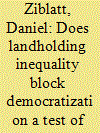| Srl | Item |
| 1 |
ID:
083782


|
|
|
|
|
| Publication |
2008.
|
| Summary/Abstract |
Recent cross-national studies have returned their attention to the structural determinants of political regimes, highlighting in particular the factor of "landholding inequality" as a decisive barrier to democratization. This article provides the first systematic test of such hypotheses at the microlevel and proposes a new account of authoritarianism's durability by examining the crucial case of pre-World War I Prussia. The article analyzes the results of a roll-call vote on a watershed piece of legislation that was defeated on the eve of World War I-legislation that would have democratized suffrage rules in Germany's largest state. When examined systematically, this historically and theoretically important vote reveals two surprising lessons: first, landholding inequality undercuts the prospects of democratization even holding income inequality constant. Second, the nature of elite competition and electoral considerations, shaped by the institutional configuration of nondemocratic regimes, can also thwart democratization, even when socioeconomic conditions may appear to make a society ripe for regime change.
|
|
|
|
|
|
|
|
|
|
|
|
|
|
|
|
| 2 |
ID:
083780


|
|
|
| 3 |
ID:
083781


|
|
|
|
|
| Publication |
2008.
|
| Summary/Abstract |
Why do some Muslim women adopt fundamentalist Islamic value systems that promote gender-based inequalities while others do not? This article considers the economic determinants of fundamentalist beliefs in the Muslim world, as women look to either marriage or employment to achieve financial security. Using cross-national public opinion data from eighteen countries with significant Muslim populations, the authors apply a latent class model to characterize respondents according to their views on gender norms, political Islam, and personal religiosity. Among women, lack of economic opportunity is a stronger predictor of fundamentalist belief systems than socioeconomic class. Cross-nationally, fundamentalism among women is most prevalent in poor countries and in those with a large male-female wage gap. These findings have important implications for the promotion of women's rights, the rise of political Islam, and the development of democracy in the Muslim world.
|
|
|
|
|
|
|
|
|
|
|
|
|
|
|
|